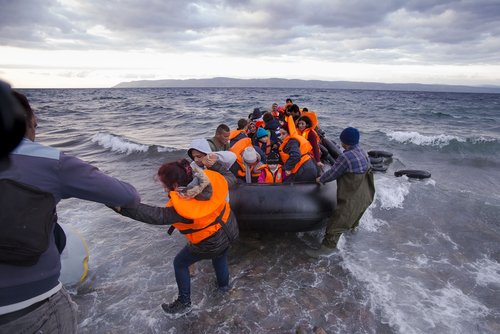More feared missing and 104 rescued from a vessel that reportedly sailed from Libya and which coastguard says was heading for Italy
Belgium (Brussels Morning Newspaper) At least 59 people drowned after a migrant boat sank off the Greek coast in the early hours of Wednesday, that country’s Coast Guard said.
No one on board the fishing boat was wearing a life jacket, the Coast Guard said. A total of 104 migrants who were traveling on the boat have since been rescued from the water and transferred to the city of Kalamata.
The state broadcaster ERT said it had sailed from the Libyan town of Tobruk, which lies south of the Greek island of Crete, with most onboard being young men in their 20s. Their nationalities, as well as where the boat had sailed from, were not immediately confirmed by Greek authorities.
Ongoing search and rescue operations are being carried out by the Coast Guard in international waters, 47 nautical miles off the coast of Pylos in the southwestern Peloponnese.
Survivors were taken to the town of Kalamata, the authorities said.
The boat’s destination was Italy, according to Greek officials.
Greece is one of the main routes into the EU for refugees and migrants from the Middle East, Asia, and Africa. Most cross to Greek islands from nearby Turkey, but a growing number of boats also undertake a longer and more dangerous journey from Turkey to Italy via Greece.
About 72,000 refugees and migrants have arrived so far this year in Italy, Spain, Greece, Malta, and Cyprus, according to UN data, with the majority landing in Italy.
Over 400 migrants died crossing the Mediterranean early in 2023 -UN agency
The tragic event in Greece has brought attention to a distressing reality: over 400 migrants and refugees lost their lives in early 2023 while attempting to cross the central Mediterranean from North Africa to Europe. This represents the highest number of fatalities in the past six years within a three-month period, according to a report by the United Nations agency, the International Organization for Migration (IOM).
Between January and March, the IOM documented 441 deaths along the central Mediterranean migration route, although it is believed that the actual number may be higher. Approximately half of these deaths were attributed to delays in state-led rescue efforts, while one case highlighted the absence of any rescue mission. Such incidents underline the urgent need for action to address the ongoing humanitarian crisis in the region.
António Vitorino, the Director General of the IOM, expressed his concern over the situation, stating that the persisting humanitarian crisis in the central Mediterranean is unacceptable. He emphasized that with more than 20,000 deaths recorded on this route since 2014, there is a risk of these fatalities becoming normalized. Vitorino called on states to respond promptly to prevent further loss of life.
The perilous journey across the central Mediterranean is predominantly undertaken by thousands of African migrants seeking better opportunities in Europe. Often using small inflatable boats, they embark from the shores of Libya and Egypt. It is important to note that this route is distinct from the Western crossing, which involves migration from Morocco to Spain.
Tragically, these voyages frequently end in disaster, such as the devastating shipwreck off the southern Italian region of Calabria in late February, which claimed the lives of at least 72 migrants. These incidents serve as a grim reminder of the dangers faced by individuals risking their lives in pursuit of a better future.




